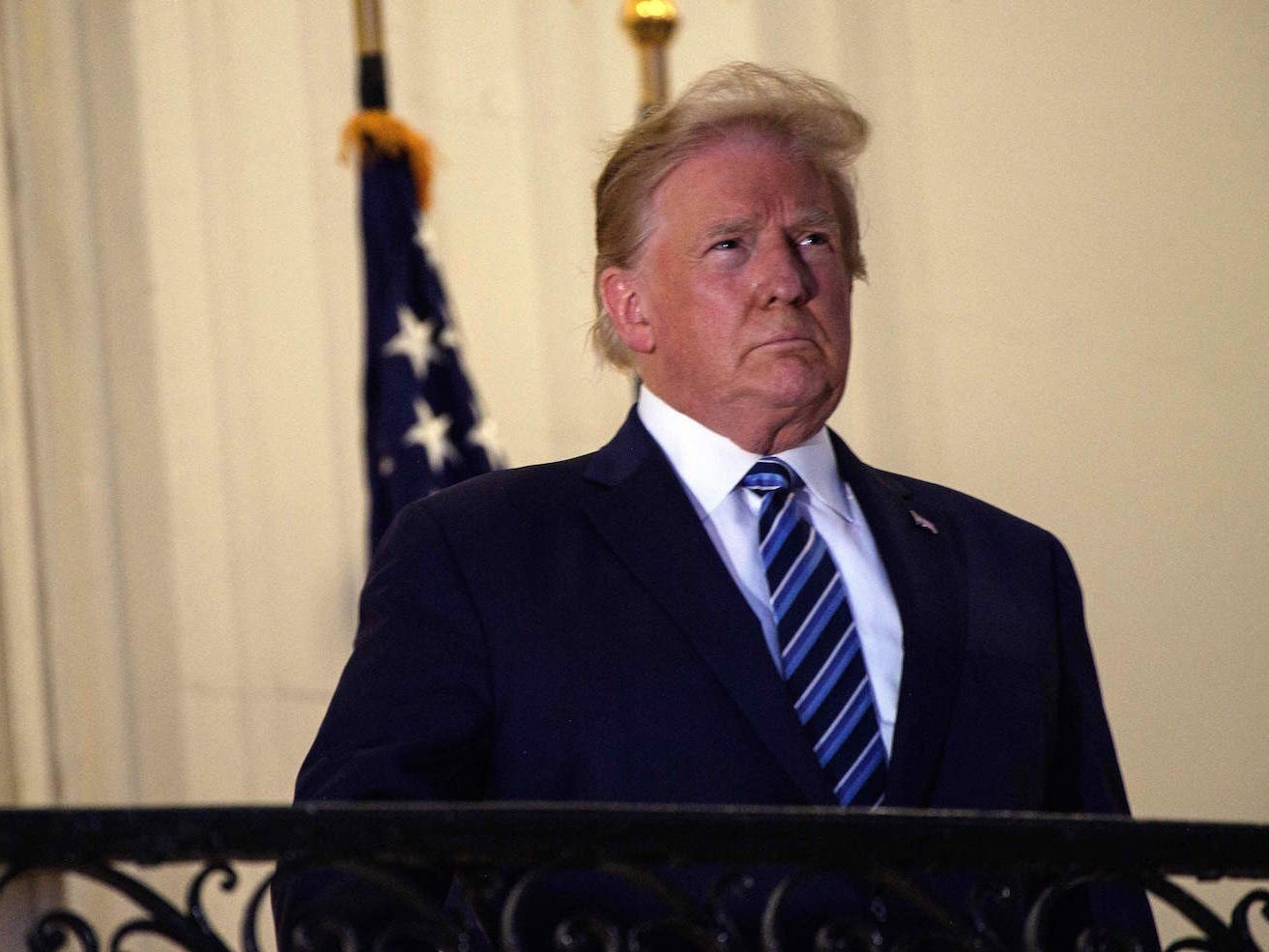
- An antibody cocktail President Trump received for his COVID-19 treatment was tested using stem cells derived from a fetus that was aborted in 1972 in the Netherlands.
- Anti-abortion organizations have spoken out against the use of these stem cells, which have been lab-engineered and duplicated, to test vaccines. Trump has also restricted use of these stem cells in research.
- Three anti-abortion organization leaders told Insider that although the testing wasn’t ethical, they stand behind Trump’s decision. One said Trump has been “sensational on the life issues.”
- Visit Business Insider’s homepage for more stories.
Anti-abortion groups told Insider they take no issue with the fact that one of President Trump’s COVID-19 treatments — which he is now vowing to make available to all Americans — was tested using cells that originally came from an abortion.
It is a research practice Trump has severely restricted during his presidency, and one pro-life groups have vehemently opposed.
To treat Trump, doctors gave him supplemental oxygen, and treatments including a steroid typically used in severe COVID-19 cases and an experimental antibody cocktail created by the US biotech company Regeneron.
To test the antibody cocktail’s effectiveness, Regeneron used an “immortalized epithelial cell line,” or cells that were altered in a lab so they can last forever when they otherwise would not. These cells, now called HEK 293T cells, were derived from an the kidneys of a fetus that was aborted in 1972 in the Netherlands.
When Insider asked three anti-abortion organizations — The Heritage Foundation, Texas Alliance for Life, and Pro Life Action League — about the origin of Trump’s COVID-19 treatment, they demurred, or said the argument was a non sequitur.
In the past, anti-abortion advocates have spoken out against medical treatments that use components derived from aborted fetal tissue at any point in the creation and testing process, including experimental coronavirus vaccines.
However, each group told Insider they will not engage in this controversy — some because they believe the cells used in testing bear little connection to the 1972 abortion, and others because the antibody cocktail itself doesn't contain traces of fetal tissue.
One organization's executive director told Insider they have no criticism of Trump and support him because he opposes abortion and has vowed to overturn Roe v. Wade, which would remove Americans' automatic right to abortion.
The fetal connection, explained
To test Regeneron's drug, the fetal cells were used to create virus particles that mimicked the coronavirus. Those, in turn, were tested on mice antibodies and antibodies from a live human donor who had recovered from COVID-19.
According to MIT Technology Review, most scientists don't view HEK 293T cells as fetal cells because of how many times they've been divided, changed, and used over the past few decades.
"It's how you want to parse it," Alexandra Bowie, a spokeswoman for Regeneron, told the MIT Technology Review. "But the 293T cell lines available today are not considered fetal tissue, and we did not otherwise use fetal tissue."
A Regeneron representative previously told Insider these cells "are immortalized epithelial cells, not stem cells, embryonic stem cells or fetal tissue."
Pro-choice advocates have called Trump's use of the treatment hypocritical.
Mary Alice Carter, senior adviser to Equity Forward, a watchdog group that monitors the influence of abortion opponents within the administration, told the Washington Post that Trump "has politically sided with folks who want to see these cell lines no longer used for therapies but went ahead and received it himself."
Anti-abortion groups have opposed using human stem-cell testing for vaccines
Texas Alliance for Life, The Heritage Foundation, and Pro Life Action League, plus others that didn't respond to Insider's requests for comment, have opposed the use of human, embryonic stem cells, including those derived from aborted fetuses, to test vaccines including a potential COVID-19 vaccine.
This year, on April 17, anti-abortion advocates penned a letter to FDA Commissioner Stephen M. Hahn, asking the agency to find "ethical" ways to test a COVID-19 vaccine that would not involve cells from abortions.
The letter has signatures from 20 "pro-life" organization leaders including Debi Vinnedge, president and executive director of Children of God for Life, an anti-abortion group.
Children of God for Life (and National Institute of Family and Life Advocates, a similar group) denied Insider's request for comment on the origin of Regeneron's treatment, and on the president's endorsement of the drug.
One anti-abortion advocate said it is not hypocrisy because Trump and his doctors weren't involved in the abortion itself
Eric Scheidler, the executive director of Chicago-based Pro Life Action League, said Trump's use of the Regeneron cocktail was ethical because the president was far removed from the abortion itself.
"In the case of President Trump, the doctors who are providing those medicines to him, those treatments to him, they were not involved with that abortion that took place decades ago," Scheidler told Insider. "They didn't assist in it. They didn't choose for it to happen. They may even wish that it had never happened, even if they're benefiting from something that came from that injustice."
Some called the experiments to test the treatment unethical, but not the antibody cocktail
In an email to Insider, a Heritage Foundation spokesperson pointed to a Twitter thread from Dr. Tara Sander Lee, the Lozier's Institute's director of life sciences.
Lee called the experiments that used cells derived from aborted fetal tissue "not ethical," but didn't call the antibody cocktail itself unethical, because it doesn't contain the cells in question.
"The abortion-derived cell line, HEK293, was used in experiments to test the antibodies, separate from antibody cocktail for treating COVID-19 patients," Lee wrote. "These experiments are not ethical, but it's important to understand no fetal cell lines were used to make antibody cocktail."
When Insider asked the spokesperson if Heritage Foundation stands behind Lee's Twitter statements, they said: "You bet. The Lozier Institute is a trusted ally and coalition partner, and The Heritage Foundation values their scholars' expert opinions, including Dr. Lee, who has spoken on a panel here at Heritage on more than one occasion."
Joe Pojman, the executive director for Texas Alliance for Life, cited a Lozier Institute post that said the antibody treatment itself doesn't contain aborted fetus-derived cells. The post, co-authored by Lee, didn't mention the use of aborted fetus-derived cells to test the antibody treatment.
Trump has been 'sensational on the life issues'
Pojman also told Insider that Texas Alliance for Life stands behind Trump and his COVID-19 treatment choice.
"We continue to be very enthusiastic about endorsing president Donald Trump for reelection. He has been sensational on the life issues, and we're very grateful to him for that," Pojman told Insider.
He said his organization sees "no reason for us to be concerned" about Trump's treatment.
"With regard to his treatment for COVID-19, it's our understanding that all of the medications he has taken have been researched and developed without the use of cells taken from aborted babies. There may be some testing involved," that used cells derived from an aborted fetus, said Pojman.
He said that in an ideal world, "there should be no involvement with cells that have been harvested from aborted babies," and Texas Alliance for Life, "would not support any further destruction of unborn babies in order to harvest cells that are used in the development of any drug or device for medical treatment," including vaccines.

